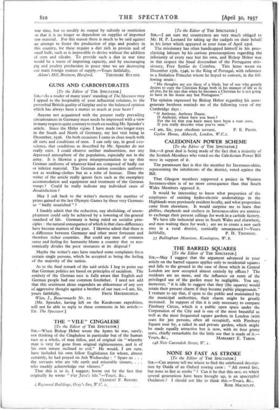GUNS AND CARBOHYDRATES
[To the Editor of THE SPECTATOR.] SIR,—As a reader of many years' standing of The Spectator may I appeal to the hospitality of your influential columns, to the proverbial British quality of fairplay and to the balanced opinion which has always been a matter so much at your heart ?
Anyone not acquainted with the present really prevailing circumstances in Germany must needs be impressed with a view in many respects quite contrary to truth on reading Mr. Spender's article. Since the Hitler regime I have made two longer stays in the South and North of Germany, my last visit being in December, 1936. On both occasions I came in close touch with all sorts and conditions of men. I can only say, in good con- science, that conditions as described by Mr. Spender do not really exist. I could observe neither malnutrition, nor any depressed atmosphere of the population, especially not in the army. It is likewise a gross misrepresentation to say that German uniforms of whatever kind are composed of badly cut or inferior material. The German nation considers uniforms not as working-clothes but as a robe of honour. Does the writer of the article really ignore facts such as the exemplary accommodation and equipment and treatment of the German troops ? Could he really indicate any individual cases of dissatisfaction ?
May I call back to the writer's memory the number of prizes gained at the last Olympic Games by those very Germans so " badly nourished " ?
I frankly admit that the reduction, nay abolishing, of unem- ployment could only be achieved by a lowering of the general standard of life. Germany is being ruled on socialist prin- ciples : the natural consequence of which is that class-differences have become matters of the past. I likewise admit that there is a difference between Germany and other more fortunate and therefore richer countries. But could any man of common sense and feeling for humanity blame a country that so eco- nomically divides the poor resources at its disposal ?
Maybe the writer's ears have reached some complaints from certain single persons, which he accepted as being the feeling of the majority of the nation.
As to the final remark of the said article I beg to point out that German politics are based on principles of racialism. The entirety of the German race is fully aware that English and German people had one common forefather. I need not add that this sentiment alone engenders an abhorrence of any sort of aggressive thought against a brother of our race.—I am, Sir, yours faithfully, FRITZ HAUENSCHILD. Wien, I., Bauernmarkt Nr. 10.
[Mr. Spender, having left on the Karakoram expedition, will not be able to reply to these comments in his article:— ED. The Spectator.]


































































 Previous page
Previous page